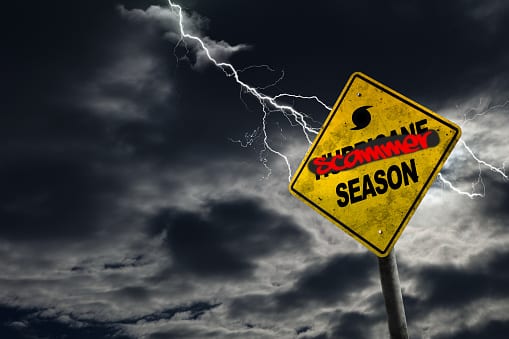Disasters such as Hurricane Matthew bring out the best in people – and the worst. Unfortunately, the phishing scammers, schemers, and con-artists – the worst – use events like this to take advantage of the best. Phishing scams are the new form of fraud in the digital age.
Don’t let your good nature leave you open to theft of your personal identity or money. If you own a business, the consequences of you or an employee getting phished can cause huge problems for you, your employees, and your clients.
US-CERT, the United States Computer Emergency Readiness Team (a division of the U.S. Department of Homeland Security) issued an alert today, but people on the East Coast have already been reporting scams targeting both victims and potential donors.
How to Avoid Phishing Scammers
Residents in South Carolina received emails promising to update them on power outages, but the links were taking them to sites that downloaded a virus or malware. Never download or click on .exe links from unknown email addresses. Be suspicious of unexpected attachments from people you do know. Check with them by phone, text, or a separate email to confirm they sent it to you and that it’s a legitimate attachment. Really, there are very few, if any, reasons for someone to send you an executable file.
Be suspicious of emails, text messages, or social media postings that purport to have attachments to links or videos of impacted areas. Be especially careful to avoid those that are demanding, threatening, or sensational. Don’t reward link bait with your clicks and don’t reward phishing scammers for their scare tactics.
Donate Only to Legitimate, Vetted Sites
Phishing scammers may try to get your credit card number directly by setting up fake donation sites which often mimic those of legitimate sites. Don’t follow links in emails, text messages, or social media to make donations. Go directly to the site of organization such as the Red Cross or Salvation Army. Use website checking tools such as Google’s Transparency Report to check sites.
Protect Your Personal and Business Information
Teach your family members, especially those who are less experienced in using the internet, to not trust any unsolicited email or text request. Train your employees to be aware of disaster email phishing scams as well as some of the sophisticated scams targeting employees such as the W2 scams which targeted HR employees by spoofing the CEO’s email.
And, if you’re ready for a much deeper analysis of your network, or worried about specific problems that your business may be currently experiencing, check out the free opportunities we have for you here.



VIEW ALL